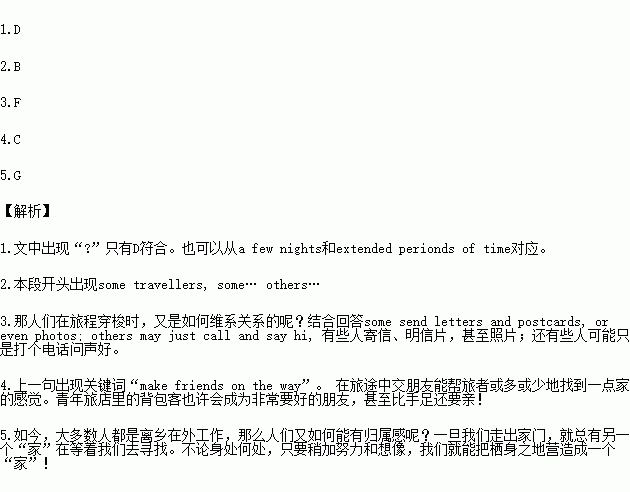题目内容
第二节 (共5小题;每小题2分,满分10分)
根据对话情景和内容,从对话后的选项中选出能入空白处的最佳选项。选项中有两项为多余选项。
Home on the Way
People need homes children assume their parents' place as home; boarders call school "home" on weekdays; married couples work together to build new homes; and travelers … have no place to call "home", at least for a few nights. _______1._______? Don’t they have the right to a home? Of course they do.
Some regular travelers take their own belongings like bed sheets, pillowcases and family photos to make them feel like home no matter where they are; some stay for long periods in the same hotel and as a result become very familiar with service and attendants; ____2.___. Furthermore, driving a camping car during one’s travels and sleeping in the vehicle at night is just like home -- only mobile!
And how about keeping relationships while in transit? ________3._________ ; some send letters and postcards, or even photos; others may just call and say hi, just to let their friends know that they're still alive and well. People find ways to keep in touch. Making friends on the way helps travelers feel more or less at home. __________4.__________.
Nowadays, fewer people are working in their local towns, so how do they develop a sense of belonging? Whenever we step out of our local boundaries, there is always another "home" waiting to be found. ________5._________, we can make the place we stay "home".
A. Hostels provide a clean safe place to stay while you are travelling the world
B. others may simply put some flowers by the hotel window to make things more homely
C. Backpackers in youth hostels may become very good friends, even closer than siblings(手足)
D. So how about people who have to travel for extended periods of time
E. No matter where you go to in the world, hotels are there, too
F. Some keep contact with their friends via internet
G. Wherever we are, with just a little bit of effort and imagination

